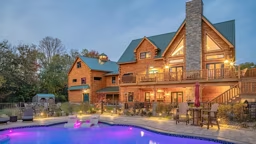 Big Bear Rustic Log Homes has achieved Energy Star certification on a model round log home in Harrison, Maine, and passed the test with flying colors. Homes need a rating of 80 or lower to qualify; this house achieved an almost unbelievable score of 59. Anthony Rauseo, Big Bear’s general manager, said this is believed to be the first round log home to achieve the Energy Star certification and the first round log home builder to become an Energy Star Partner.
Big Bear Rustic Log Homes has achieved Energy Star certification on a model round log home in Harrison, Maine, and passed the test with flying colors. Homes need a rating of 80 or lower to qualify; this house achieved an almost unbelievable score of 59. Anthony Rauseo, Big Bear’s general manager, said this is believed to be the first round log home to achieve the Energy Star certification and the first round log home builder to become an Energy Star Partner. “The home is almost 5,000 square feet but would only consume about $1,700 in oil per year, which (Energy Star) said is an amazing number, one-third the amount of a normal house this size,” Rauseo said. “The energy efficiency came in at a rating that far exceeded any stick-frame home they’ve ever evaluated. “We used 27 different energy-saving techniques in the construction of the home to get the certification. We used dead-standing timber, 50-year energy seals, R-70 in the ceilings, hybrid energy systems like passive solar, even insulation under the slabs.” Rauseo said choosing the right materials is most important. “There’s 110,000 pounds of logs in this house, and it’s all dead-standing timber out of Canada,” he said. “You pay a little more, but we’re going to minimize shrinkage, joint cuts, and you’re going to get a tight house. We use longer logs, up to 60 feet. Anybody can buy the long logs; it’s a matter of doing what’s right during construction.” Rauseo said the company would add geothermal heating as well, in a warmer environment than Maine.
Rauseo said Energy Star inspects the house for three things: Air flow, appliances and their efficiency, and oil consumption. “The ultimate test is the blower-door compression test,” he said. “That basically assesses how tight the house is. This house is four times tighter than a normal, stick-frame home.” The company has also achieved status as a USDA Green Building Partner, Rauseo said. That involves more than energy efficiency. “For instance, there is no polyurethane in this house,” he said. “There is no fiberglass insulation.” Rauseo said the company has been working toward this for years. “I was committed to building an Energy Star log home; I knew it could be done,” he said. “We’ve always built them energy-efficient, but we’ve tried to bring back a lot of the old expertise in the construction business. We didn’t take any shortcuts. So we’re building everything energy-efficient. Everything we build will be like this.”
Energy Star homes cost more, and consumers have to pay for the testing, but they get an immediate tax credit if the home passes. Rauseo said the costs should pay for themselves in 6-7 years on this home because of lower heating and electrical costs. “You’re going to pay more, let’s face it,” he said. “There’s a difference in price to do it the right way. But oil, natural gas and propane are not going to come down.” Alta Log Homes has been producing Energy Star full-log homes for over three years in a unique profile that looks round at a glance but is not. So the log-homes industry has a pair of Energy Star builders, more proof that logs are "green," even when they're dried and stacked.











